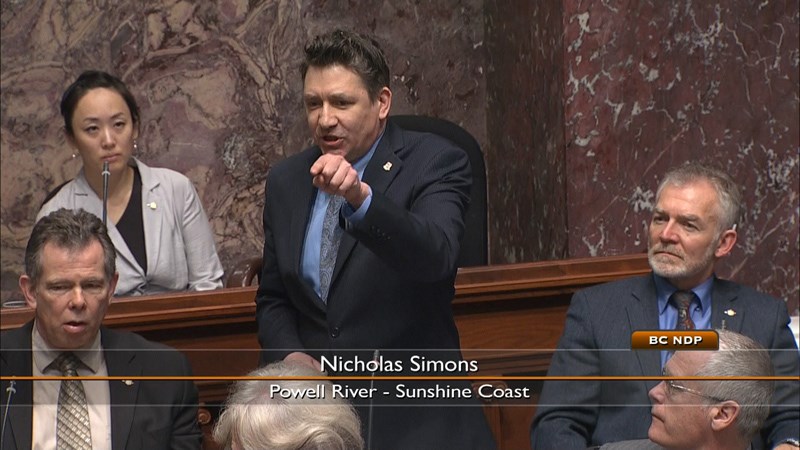Powell River - Sunshine Coast MLA Nicholas Simons was at the centre of a tumultuous ending to the B.C. legislature’s spring session last week.
Simons, the NDP agriculture critic, was told by the deputy speaker to leave the House on May 29 after calling the Liberals “a bunch of corrupt liars” during the final debate on a contentious bill to change the Agricultural Land Reserve (ALR).
After initially refusing to withdraw the comment, Simons returned about half an hour later and withdrew it in order to vote against Bill 24, which passed 46-30.
In an interview, Simons said his outburst came when he was preparing to give his final arguments against the bill after 11 days of debate. Instead, Agriculture Minister Norm Letnick announced that he would speak till the end of the allotted time.
When Letnick rose and declared himself the “designated speaker,” Simons said Letnick “smiled at me — he was almost taunting me.”
“You’re a bunch of liars, a bunch of corrupt liars,” Simons said in response.
Simons said he was expecting to speak for about 30 minutes and then allow Letnick to close the debate.
“It was unconventional and a dirty trick. They were going to win the vote — nobody had any doubt. It was an extra kick,” he said. “No one likes to be muzzled. That’s the only tool we have in the legislature, is our words.”
Letnick’s move surprised him, he added, because “we had an open relationship and were pretty communicative” since Letnick was appointed in April.
Speaking Wednesday from Ottawa, where he was attending meetings, Letnick said Simons was incorrect about the time allocation for the debate, as there was not enough time for both of them to make their closing speeches.
“I’m just following the rules of the House, and I think it’s unfortunate that he didn’t get a chance to speak prior to me speaking,” Letnick said. “Nothing personal was meant on my part regarding the way the end of the debate on Bill 24 occurred.”
Opposition members, he said, spoke for about 42 hours during second reading of the bill “and had lots of time to provide their perspective.”
Letnick said he would have liked to have seen the bill go to the committee stage, where it would have been reviewed section by section, allowing the Opposition “to dive into even more details of the bill and perhaps deal with other concerns.”
That opportunity never came, he said, “because we spent all the time dealing with the bill on a higher level, rather than section by section.”
Simons, meanwhile, said the Liberals have played it “tricky” on the ALR changes from the beginning, not allowing proper consultation and not disclosing their plans before last year’s election.
“Dishonesty runs through this whole legislation,” he said.
With farm groups, food security advocates and local governments lined up against the bill as written, Simons said he had “never seen such a lopsided opinion about a piece of legislation,” which sprang from Energy Minister Bill Bennett’s core review process.
Opposition to the bill, he said, has been “almost unanimous, except for the two or three people who have been advocating for this in Bill Bennett’s [East Kootenay] riding.”
Bill 24 separates the ALR into two zones, allowing economic and other factors to be considered in determining land use for zone two, which includes the North, the Kootenays, the Cariboo and other parts of the Interior.
Simons and other critics of the bill say weakening the ALR in zone two by allowing non-agricultural uses will threaten B.C.’s food security at a time when other jurisdictions are strengthening their protection of farmland.
And while the current agricultural protections will remain intact for zone one (the South Coast, Vancouver Island and the Okanagan), Simons said the whole province will be directly affected by the legislation, as decision-making will be handed over to six regional panels.
“Regional panels have been in place before and proved to be terribly inadequate,” he said, as they “end up being influenced more by local opinion, rather than the broader, cumulative approach” taken by the Agricultural Land Commission (ALC), and are more likely to be subject to development pressures.
The regional panel system splits the Sunshine Coast by including the upper end with Vancouver Island and the lower end with the South Coast, which also includes the Lower Mainland and Fraser Valley.
To counter the pressure imposed on ALR lands by Bill 24, Simons said it’s important for communities to safeguard farmland and be vigilant about supporting producers through methods such as government food procurement programs and developing rules to allow operators to sell as much as possible locally.
Defending Bill 24, Letnick said its purpose “is to keep our farmers on their land, to earn a better living, and to keep, of course, the independence of the ALC when they make decisions according to the Act.”
Letnick said he looked forward to the next stage of consulting on the regulations to the amended Agricultural Land Commission Act “and working with all other stakeholders to increase agriculture from its current $11.5 billion a year to about $14 billion by 2017.”



